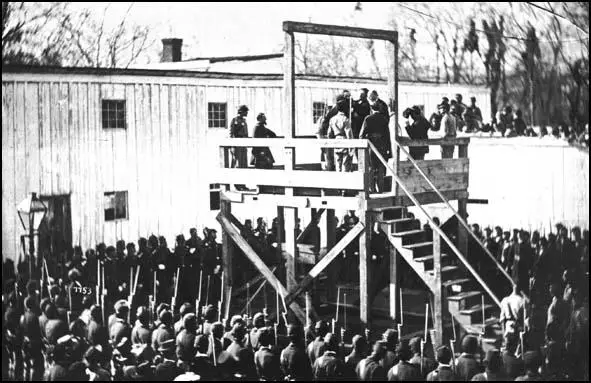John H. Winder
John Henry Winder was born in Maryland on 21st February, 1800. He joined the United States Army and taught at U.S. Military Academy at West Point in 1837 he joined the United States Army and saw action in the Seminole War (1838-42) and the Mexican War (1846-48) where he won two brevets.
On the outbreak of the American Civil War he joined the Confederate Army. He was appointed brigadier general and placed in charge of Libby Prison in in Richmond.
In May, 1862 President Jefferson Davis placed Winder in command of Richmond. He was also given the task of organizing the care of all Union Army prisoners east of the Mississippi.
During the summer of 1863 an agreement under which Union and Confederate captives were exchanged, came to an end. There was now a rapid increase in the number of prisoners and so it was decided to build Andersonville Prison in Georgia. In April, 1864 Winder appointed Henry Wirz as commandant of this new prison camp.
By August, 1864, there were 32,000 Union Army prisoners in Andersonville. The Confederate authorities did not provide enough food for the prison and men began to die of starvation. The water became polluted and disease was a constant problem. Of the 49,485 prisoners who entered the camp, nearly 13,000 died from disease and malnutrition. John Henry Winder died on 7th February, 1865.
When the Union Army arrived in Andersonville in May, 1865, photographs of the prisoners were taken and the following month they appeared in Harper's Weekly. The photographs caused considerable anger and calls were made for the people responsible to be punished for these crimes. It was eventually decided to charge General Robert Lee, James Seddon, the Secretary of War, Henry Wirz and several Confederate generals and politicians with "conspiring to injure the health and destroy the lives of United States soldiers held as prisoners by the Confederate States".
In August, 1865 President Andrew Johnson ordered that the charges against the Confederate generals and politicians should be dropped. However, he did give his approval for Wirz to be charged with "wanton cruelty". Wirz was found guilty and executed on 10th November in the same yard where those involved in the assassination of Abraham Lincoln had died.

the death warrant to Henry Wirz on the gallows at Washington Penitentiary.
Primary Sources
(1) Marion Merriman, American Commander in Spain: Robert Hale Merriman and the Abraham Lincoln Brigade (1986)
As we drove into Madrid, the first thing we saw was the big bullring - the Moorish architecture, arch upon arch, dusky brown with beautiful coloring in the tiles, the columns. It was magnificent, I thought. Entering Madrid was like entering any big city's industrial section. We drove through a ring of factories, then into the nicer part of the city.

